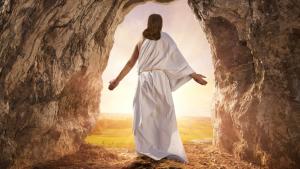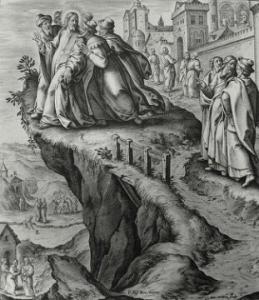With the concepts of altered states of consciousness and conversion, I argue for the truthfulness of the apostles’ experience of Jesus’ resurrection.

Surely a better time to write about the resurrection is during Easter Season, which ended with the Feast of Pentecost. And yet, it’s appropriate to think about resurrection now if the suggestion I’m going to make is correct. That is: The certainty that Jesus was alive after he died on the cross may have taken a while to develop, even among those who had experienced him alive again. Probably more than 40 or 50 days.
A confusing story
In the Bible we don’t see the resurrection. We see Jesus alive after having been crucified in a bewildering series of stories. Questions abound. For example,
- Did two women hear a message from an angel in Jesus’ tomb and announce the news to the disciples? (Matthew)
- Or was it a young man in a white robe with a message to three women, who fled in fear and didn’t say anything to anybody? (Mark)
- Or did three women (but not all the same women) hear a message from two angels? (Luke)
- Did Jesus promise to meet the disciples in Galilee (Matthew and Mark) but appear to them in Jerusalem anyway? (Luke and John)
- Did the women not enter the tomb at all but only Peter and the “other disciple”? (John)
- Did Peter see Jesus first (Paul), or did Mary Magdalene (John)?
With some picking and choosing, the Bible gives us the following rather short timeline:
- The discovery of the empty tomb on Sunday morning, the “third day”;
- Then appearances of the risen Jesus in rapid succession: to Peter (I put him first, following Paul),
- To Mary Magdalene and other women,
- To Clopas and companion on the road to Emmaus,
- And to the apostles minus Judas and Thomas—these five all on that first Easter—and
- A week later to the apostles with Thomas.
Apostles not really sure of the resurrection yet
By this time all the apostles, except Judas, and some women must have believed in Jesus’ resurrection, right? But even after several more appearances, including to 500 people at once according to Paul, some are still not sure. Matthew ends his resurrection stories with the eleven disciples on a mountain.
When they saw him, they worshiped him, but some doubted.” (Matt 28:17)
Why did some doubt? Luke in Acts says,
After his suffering he presented himself alive to them by many convincing proofs, appearing to them during forty days and speaking about the kingdom of God. (Acts 1:3, my emphasis)
Wouldn’t one convincing proof have been enough?
Resurrection, conversion, and altered states of consciousness
Edward Schillebeeckx describes the resurrection appearances as experiences of conversion. (Jesus, pp. 380-392) Conversions usually take a while. Maybe New Testament writer Paul’s conversion was of the rarer kind that happens in a flash. In any case, the conversion that I’m thinking of is a radical change of mind and heart, a new outlook, a rethinking that changes everything. In the bible’s Greek it’s the metanoia that Jesus called for, which we so weakly translate as repentance. (Although even “repentance” contains re-thinking etymologically.) That will be my major hypothesis—believing in resurrection means conversion.
A second hypothesis comes at the suggestion of Patheos Blogger “Fellow Dying Inmate.” He thinks the resurrection appearances were cases of altered states of consciousness, experiences of alternate reality. Probably such experiences take their outward form from images already available—the body of a deceased loved one, a young man clothed in white, a huge catch of fish, or familiar and beloved scenes from Scripture. You can understand how one person’s experience can conflict with another’s if taken literally. It makes sense also that a person might want more than one of these strange “proofs” and that it might take a while.
Resurrection and alternate reality
In a court case it’s important to establish the trustworthiness of witnesses. In this case if the DA asked, “Are the witnesses who say Jesus was alive after being dead and buried trustworthy?” we’d have a ready answer. You can hardly find more trustworthy witnesses than people who stake their lives on the truth of their testimony. But a court in the 21st century also has to deal with the testimony itself, which comes in a rather strange form. It’s in 2000-year-old stories of events or experiences that were written about long after the experiences themselves and, perhaps, were not even meant as literal, factual reports. At least, taken literally, any mediocre lawyer could find inconsistencies in the stories and get the case thrown out.
I’ve gotten comfortable with the idea that first century writers do not necessarily follow the same standards of historical reporting as a modern historian. I’m OK with Bible stories that interpret rather than merely report. What the resurrected Jesus meant for those first Christians is captured beautifully in Luke’s story of Jesus’ appearance to Clopas and companion on the way to Emmaus. I’ve written a short book on “Opening the Scriptures on the Way to Emmaus”; I like it that much. Whether Luke was reporting something that actually happened or making up a story I’m not so sure.
But something must have happened. At least some of the reports of appearances of the risen Jesus must be about some historically real experiences. Patheos blogger Fellow Dying Inmate, discussing altered states of consciousness, says,
You can record [on cell phones maybe] events in consensus reality. But things are different when encountering the risen Jesus in alternate reality. (“Encountering the Risen Christ,” May 28, 2020)
Alternate reality and legitimacy, or truth
Altered states of consciousness are common phenomena in every age and practically every culture of the world. The lone exception could be my own modern Western culture, and even here stories of ghosts are popular. People still see their loved ones who have died, or imagine they do. And there still is the occasional phenomenon of a heavenly apparition.
The trouble with altered states of consciousness is you need an alternate method for establishing their truth. That someone sees a ghost doesn’t mean I should believe it. Do such experiences ever reveal an alternative that is real in any legitimate sense? Or do hallucination and hysteria provide the only necessary explanations?
I don’t think ghosts are real. For one thing, they defy the laws of science, but that’s not the main thing. I do believe in some things that, if not contrary to science, are at least unknown to science—grace, for example, and maybe angels. One reason for my skepticism about ghosts is that I don’t see any benefit flowing from believing in them. Ghosts would make no positive difference in my life even if they were real. I’m not going to change my lifestyle to accommodate ghosts, even ghosts who, reportedly, do mischievous things.
An odd method of verifying
Looking for consequent lifestyle changes may seem like a strange way to justify belief or unbelief; but it’s like what the Church does when someone claims to have seen, for example, an apparition of Jesus’ mother. We try to establish the trustworthiness of the witness or witnesses. More important, I believe, the Church looks for the graces that should follow from any real heavenly apparition. An enthusiastic crowd of pilgrims is not necessarily a grace, and hallucinations, mass hysteria, and plain chicanery don’t have much association with graces for the world. But when Our Lady of Guadalupe becomes a source of hope for poor, indigenous people, that is a grace.
In the case of Jesus’ resurrection appearances, we can trust that the witnesses weren’t lying. Can we be sure that they weren’t deceiving themselves, that they weren’t victims of hallucinations or mass hysteria? To answer that I’m going to use that odd method of looking for grace.
Perhaps all we have in the apostles’ extraordinary post-crucifixion experiences is a way of dealing unconsciously with the grief and shock of losing the one who had become the center of their lives and hopes. Or, maybe we’ll find that these experiences were not self-serving at all. Maybe, instead, they were a continuation of what Jesus was all along inspiring, with more or less success, in those who believed—metanoia, a change of mind and heart, repentance in the much stronger than usual sense, rethinking an entire existence, conversion. That would be grace and a kind of evidence.
Changing the timeline
The Gospels give us a short time frame. Resurrection appearances begin on the third day from Jesus’ crucifixion, the first Easter. They end 40 days later as Jesus ascends to his Father’s side in heaven. On the Jewish feast of Pentecost about 200 of Jesus followers are said to have had another altered kind of experience. The Holy Spirit appears in wind and tongues of flame, giving them not only understanding but also courage to go out and proclaim Jesus as the resurrected Messiah. That’s about 50 days. But we have these stories in Gospels and the Book of Acts, which were written between 40 and 70 years after Jesus died. That gives us a more generous timeline for the process of coming to understand and believe in Jesus and resurrection.
It was less than 40 years. There may have been earlier “proto gospels,” which are lost to us; and there are some important writings that we do have, written before the first Gospel. These are the letters Paul wrote in the decade of the 50’s, some 20 years after Jesus. So I will turn to Paul for some clues to the development of Christian’s belief in resurrection.
Paul is the murderous persecutor of Christians. He also appears to be something of a mystic. At least, he had a mystical experience of the risen Jesus just as he was on the way to another rendezvous with those troublesome Jesus followers. Mystical experiences would qualify as altered states of consciousness. Usually they are hard for someone else to interpret. But we can say for sure that Paul’s was a conversion experience.
When Schillebeeckx says the resurrection stories in the Gospels are conversion stories, he’s thinking mostly of the apostles’ turn away from their cowardice during Jesus’ trial and crucifixion. Paul’s experience was anything but a turning away from cowardice. I’m suggesting the apostles’ sin was more than cowardice and their conversion more thorough than just getting braver. It was more like Paul’s, a redemptive change in the direction of one’s whole life. Paul underwent a total re-envisioning of what life was about and what God required of him. I want to suggest that the earlier apostles’ experience was similar. For both it doesn’t happen without some contact with truth, mystical or otherwise, altered or everyday consciousness, alternate or consensus reality.
The human condition
Paul must be working with a concept of sin much different from ours in the modern, individualistic West, when he says about Jesus,
For our sake he [God] made him [Jesus] to be sin who did not know sin …. (2 Corinthians 5:21, my emphasis)
When Paul wrote that, he was thinking of sin as a basic condition of a person’s existence, like being white, or American, or Jewish. The Catholic Church derives a doctrine of Original Sin from Paul and, I think, rightly. But when we think about being born with Original Sin on our “souls” (those souls, oddly, being fashioned directly by God with this defect already “on” them), we’re thinking too individualistically, as we Westerners tend to do. We too are “made sin” by the condition into which we are born. God’s creation is good, but we are not born directly into creation or nature. We are born into a largely human-made world.
Paul describes his former life
Paul describes what was wrong with the life he once lived:
Circumcised on the eight day, of the race of Israel, of the tribe of Benjamin, a Hebrew of Hebrew parentage, in observance of the law a Pharisee, in zeal I persecuted the church, in righteousness based on the law I was blameless. (Philippians 3:5-6)
Sounds good except for that part about persecuting the church, but even there he was being righteous “based on the law.”
That law was one of the best things that Paul knew of the world he lived in. Other best things were the temple, which the Romans would soon destroy, and the Scriptures. I imagine Jesus would have felt the same. Yet the Law with its cadre of interpreters, the temple with its priesthood and sacrifices and taxes, and even the Scriptures with their misogyny, xenophobia, and other prejudices were infected with sin. We can say the same thing about our world. Even in its best parts there is disorder. Even our loves are partly selfish. Our grandest accomplishments rest on violence. Our noblest thought constructs are at least partly self-serving ideologies. Not even our most prized institutions are innocent. Into this world we are born and by this world we are shaped.
Paul’s conversion
My reading of the Scriptures that Paul and Jesus revered uncovers a large amount of sacred violence. God destroys practically the whole human race and almost all the animals in a flood as retribution for the world’s sinfulness. At another extreme Jephthah, a judge in Israel, sacrifices his daughter to fulfill a vow to God and save his self-respect. In between are the plagues that God inflicts on the Egyptians in the story of the Exodus and the ethnic cleansing in Joshua’s version of the Israelites’ invasion of the Promised Land.
Yet these same Scriptures exhibit a healthy strand of self-criticism. The writer of the Jephthah story sympathizes with the unnamed daughter, and the Book of Judges offers an alternate, more peaceful version of the Israelites’ settlement in Palestine. The prophets call down God’s judgment on kings, priests, and the rich and powerful in general for neglecting the weightier elements of the law: God desires justice, not sacrifice.
Perhaps these scriptural hints of a life that confronts patterns of self-righteousness were operating on Paul before his mystical encounter with Jesus, while his life was going along the well-trod path of sacred violence. Jesus brought those hints to life for Paul. Maybe all at once in that flash on the Damascus road. But it may have been building bit by bit aided by what Paul knew of the ones he was persecuting and their leader. Either way, the mighty Paul must have been moved by Jesus’ strange attitude toward power visible in the behavior of Christians.
If Paul had met a power opposed to his own, if Christians had put up a fight, he could hardly have experienced conversion. Paul’s conversion had to be away from power and the violent energy that a sense of superiority brings.
The apostles, like Paul
What was going on, long before Paul, in the lives of the apostles? We read quite a bit less about the apostles’ change of heart than Paul’s. So I will use Paul’s experience as a clue. I think their transformation was something like his.
The apostles don’t seem like Paul, sinners in some monumental way. They were cowards at the end. They must have felt pretty bad about that. But that’s weakness, very much unlike Paul’s sin.
I don’t think the apostles’ change was just a matter of getting braver. It was the sort of thing where everything changes, as happened later for Paul. It was metanoia.
Jesus said on several occasions, “Repent (metanoeite) for the Kingdom of God is at hand.” But the apostles hadn’t changed their way of thinking while they followed Jesus around Galilee and Judea. They didn’t understand the inclusive vision Jesus manifested by words and deeds. That strain of the Older Testament that opts for the poor in the prophetic books and criticizes Jewish exclusiveness in the books of Ruth and Jonah was lost on them. They were rivals with each other and pursuers of triumph for Israel and honor for themselves.
Jesus’ horrible death, his defeat, took that bit out of them. They could no longer think of triumph in the world. Jesus died the shameful death of the most despised criminals. They could no longer think of honor and status. Cowardice and shame completed the collapse of their previous sense of their place in that world, where competition for honor and status were so important. They needed a new vision, and for that they needed to discover exactly what was wrong with their old vision. That would have taken time and maybe some help from beyond.
Remembering more than cowardice
After the disappointment of Jesus’ death, I don’t think the apostles could have come up with a new vision by themselves, at least not a true one. They might have become cynics like some trendy philosophers. They might have joined the Zealot rebels. Or withdrawn like the ones who left the Dead Sea Scrolls in the desert. Instead they came to believe “by many convincing proofs” that God approved of Jesus. What was shameful in the eyes of the world—the apostles’ own world—was honorable in God’s eyes. It took a while to understand that.
I’m imagining the apostles getting together, men and women apostles, days and weeks after the crucifixion. They have amazing stories to share. They tell of “seeing” Jesus again, of “hearing” forgiving words from his lips: “Peace be to you.” They settle down to a meal together and continue telling stories. Some of the stories are about meals with Jesus, but not only Jesus. A variety of others were there—rich but unpopular Pharisees, hated tax collectors, merely despised poor, the so-called sinners. (But are they really sinners just because they are too poor to follow all the prescriptions of the law?)
Now the stories get more personal. They remember incidents like:
- When they argued about which of them would be greatest in Jesus’ Kingdom. And Jesus said, “If anyone wishes to be first, he shall be the last of all and the servant of all.” (Mark 9:33-35)
- When they wanted to stop someone from driving out demons in Jesus’ name because “he was not following us.” And Jesus said, “Whoever is not against us is for us.” (Mark 9:38-40)
- When they tried to keep children away from Jesus. And Jesus explained, “The Kingdom of God belongs to such as these.” (Mark 10:13-16)
A world without status
I used to think that the last episode with the children showed the apostles’ misplaced but sincere concern for Jesus. Jesus must have been tired and hardly ready for a mob of boisterous kids. But this story in Mark’s Gospel doesn’t say anything like that. That wasn’t the apostle’s motive or excuse. More probably the apostles thought about children the way everybody in the first-century Mediterranean world did. Children were the lowest on the hierarchical chain of being. In the apostles’ minds children were unworthy of associating with the great master. But Jesus was with the children in the same way that he was with the tax collectors and “sinners” and all the rest of those whom society marginalizes. The world Jesus was constructing did not have a hierarchy and status levels. That put him in a dangerous place, at odds with society’s most powerful elements.
The apostles came to realize, finally, that they regularly took sides with the forces that killed Jesus, the forces that exclude certain others and cling to a sense of holy righteousness. Imagine what that might have felt like. And imagine what it must have felt like to know they were forgiven by Jesus himself. He told them so: “Peace be to you.” Imagine a feeling of unbounded energy and confidence, enough to finally adopt for their own Jesus’ world of equal honor for all, or no honor at all except God’s.
True or false, hallucination or real
Was the apostles’ experience of the risen Jesus in altered consciousness true or a hallucination? How could they tell? A hallucinated sight and voice from heaven look and sound just like a real one.
To illustrate: There’s a story in the Book of Joshua about an unfortunate individual named Achan and an energetic and unified mob who also had an odd experience.
There was a time when the Israelites weren’t so energetic and united. They had just lost a battle and were, as I imagine it, at each other’s throat in blame and recrimination. Then God explains (perhaps in another altered state of consciousness) the reason for their defeat. Someone disobeyed God’s command. He kept some forbidden loot from the just-completed conquest of Jericho.
A casting of lots reveals that the guilty party was Achan. No longer at each other’s throat, except for one throat, the Israelites rise up united and kill Achan and his family for good measure. They feel so great about that, so united, and so filled with energy that they proceed to destroy ten towns in rapid succession.
Between this feeling of energy and purposefulness and that of the early followers of Jesus in their resurrection experiences, there isn’t any difference—as a feeling. But the reality is completely different. The apostles may have experienced the same feeling of energy and purposefulness as the earlier Israelites did, but it said something different. It didn’t exclude anyone or adopt a righteous manner. The apostles did feel forgiven. Compared to the Israelites’ experience, this is at least honest. It doesn’t hide its complicity in evil but admits sin and goes on to a complete change of attitude. Jesus continues the work of teaching and healing and changing hearts that he started in Galilee.
Evidence for the resurrection
The feeling the apostles had from their strange experiences of the risen Jesus was not evidence of any reality, alternate or otherwise. No more does the energy and unity that the Israelites’ feel in the Achan story mean that they’re on the right track. Today we’d call the Israelites’ action ethnic cleansing. From a modern vantage point we can also examine the accounts of what the apostles were attempting in their early enthusiasm for Jesus. I’d call that a part of Jesus’ great step forward for humanity.
Only truth changes people for good. The apostles were changed. That they got braver is certain, but a hallucination could have accomplished that without changing anything else. Bravery wasn’t the good part of the apostles’ change. Bravery can serve wrong hopes, like the all-too-worldly kingdom the apostles first imagined. History is full of stories of people bravely suffering and dying for a lie or a mistake.
Somehow, after Jesus died, the apostles’ false hope changed to a true one, a vision Jesus called the Kingdom of God. Rather than true in an absolute sense, I should say truthful and honest. It was an aspiration in a direction that even today seems as good as any that our very different and in some ways more advanced world offers. The apostles got braver, but, more important, they got truer.
Conclusion
Some researchers have tried to establish on historical grounds the fact of Jesus’ resurrection. Others say it can’t and shouldn’t be done, that it’s a matter for faith only. Faith is a step or two beyond reason, but faith without reason is not human. Reason can’t prove faith, but it can lead up to faith’s brink, so to speak.
Historical research verifies that something amazing happened among Jesus’ followers in the aftermath of his death by crucifixion. Applying the ideas of conversion and altered states of consciousness leads me to this conclusion about that amazing thing:
The experiences of those who claimed to see the risen Jesus weren’t the normal kind that you could record on video if you had been around then with your cell phone. They were experiences in an altered state of consciousness, for which confirmation is inherently difficult. But we know something about the change, the grace, that was working in these witnesses’ vision and subsequent lives. That gives us good reason for counting on the truthfulness of their experience of Jesus risen from the dead.
A frightening afterthought
Jesus must have known that the apostles would need many more than one “convincing proof.” How many does our world need, and where can these “proofs” be found? Only in the odd evidence of the lives of Christians, the difference that Christians make, the grace we Christians bring (or fail to bring) to the world.
Image credit: BBC News












